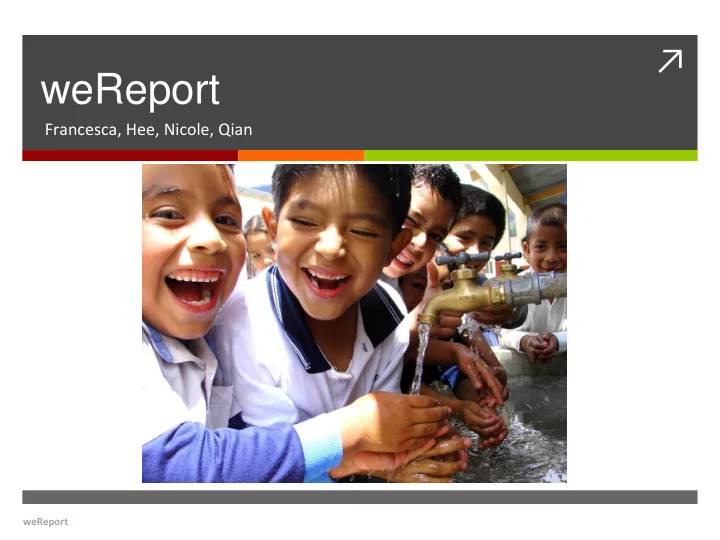

↗ weReport Francesca, Hee, Nicole, Qian weReport
Problem space • • 7,000 Peace Corps Volunteers at any given time • $318.8 million is budgeted every year • no current community feedback mechanism = ineffective monetary spending * weReport • informal feedback
Problem space Who will care about a solution? • US Government (USAID) • Peace Corps Organization and Volunteers • Community Members Who will a solution effect? • All stakeholders • Selected Latin American Communities (short-term) • All communities with Peace Corps presence (long- term) * weReport
Project description weReport will be a user-friendly, intuitive platform that would allow NGO-affected community members to publically and anonymously report feedback on developmental projects using SMS . * weReport
Project description using weReport... • community members will be able to voice concerns • Peace Corps will be able to use the information collected to more effectively allocate resources The main elements • existing infrastructure in project communities (feature phones, smart phones) • computers in the US for data aggregation * weReport
Design Challenge • restricting the design to use the existing technology infrastructure • each community has its own set of cultural factors (language barriers, literacy, SMS plans, cellphone sharing, etc) • community members may be concerned about anonymity • across all countries with a Peace Corps presence (about 68, spanning across the world), existing infrastructure and cultural factors vary dramatically * weReport
Related work • Many humanitarian crowdsourcing projects relate to weReport, including... • Alive in Afghanistan (Todd Huffman) • Ushahidi • Our contacts include: • Jaron Reed (Peace Corps, volunteered in Guatemala) • Todd Huffman (Alive in Afghanistan) • Other Peace Corps volunteers • Developers of open-source tools like ODK and FrontLine SMS • What makes this project novel/interesting? • Huge scope • Many small projects, feedback not mapped based on location • How do we generate a consistent flow of feedback? * weReport
Findings so far What did you do? • Surveyed PCVs • Talked to Jaron, Todd, Trevor What did you learn from your fieldwork? We need to narrow our scope to a few countries (Latin America) What further fieldwork is needed? o Need to explore which specific existing technologies we'll use (ie ODK, Frontline SMS) * weReport o Further research for future target countries, outside of Latin
Data Collected • * weReport
Data Collected • * weReport
Data Collected • Most areas spend less than 10$ a month on phone services * weReport
Basic scenario * weReport
Architecture * weReport
Design and evaluation How will you iterate on your prototype and its UI? o Talk to PCVs in initial countries of deployment about what works and what doesn't Who will you ask to provide feedback? o PCVs How will you evaluate your prototype and its UI? o Amount of feedback o Usefulness of feedback o General sentiment of PCV * weReport
Plan for next quarter Week 1-2 : ODK, ODK Aggregate, and SMS Frontline running on the devices. Week 3 : Test out system locally and focus on security and reliability. Week 4 : Redesign based on the findings on Week 3, have a fully functional prototype done. Week 5-6 : Send out cellphones to Latin America and have PCVs test it out in the field. Gather data and feedback at the same time. Week 7-10 : Analyze the feedback and redesign, re-evaluate, re- implement. * weReport
Recommend
More recommend